Washington, D.C. – Auto insurance prices are often more closely aligned with personal economic characteristics than with drivers’ accident and ticket history, according to new research by Consumer Federation of America (CFA). Testing premiums offered by the nation’s five largest insurers in ten U.S. cities for drivers with different socio-economic characteristics and different driving records, CFA found surprising results, including:
- Upper-income drivers with DUIs often pay less than good drivers of modest means with no accidents or tickets on their driving record. In 21 of the 30 tests (70%) in which a comparison was possible, a moderate-income driver with a perfect driving record was charged more for basic liability insurance than a high-income driver with a recent DUI conviction.
- Moderate-income drivers with perfect records pay more than upper-income drivers who caused an accident in which someone was injured. In 20 of 38 tests (53%), moderate-income drivers with clean records were charged more than high-income drivers who recently caused an accident resulting in bodily injury.
- Progressive and GEICO consistently charge upper-income bad drivers less than moderate-income good drivers. The premium for a basic auto insurance policy from these two companies cost more for a good driver with a moderate-income than for a higher-income driver with a recent accident and/or violation on her record 78 percent of the time. State Farm was more likely than any other company to charge the good driver a lower rate than a driver with accidents or violations on her record, irrespective of social status.
- Moderate-income good drivers often pay more than upper-income drivers with multiple points on their record. In over half of the tests (19 of 36), a moderate-income driver with a perfect driving record was charged more for basic insurance than a high-income driver who caused an accident and was convicted of a speeding violation within the past 12 months.
“It is profoundly unfair that a driver with a moderate income and a perfect driving record is often charged more for auto insurance than higher-income drivers with DUIs, accidents and speeding tickets,” said J. Robert Hunter, CFA’s Director of Insurance and former Texas Insurance Commissioner. “As long as state governments require drivers to buy insurance, they should require insurance companies to price their product based on how we drive, not who we are.”
Most people believe it is fair for auto insurance companies to use at-fault auto accidents and moving violations, but not factors related to economic status, when setting premiums, according to a June 2016 poll conducted by ORC International for CFA. In this national survey of 1,000 representative Americans, well over four-fifths of respondents said it was fair for insurers to use at-fault traffic accidents (84%) and moving violations (85%) in their pricing. Yet, only a minority of respondents indicated it was fair for insurers to use level of education (29%), marital status (32%), occupation (35%), no previous coverage because no car (30%), or homeownership (35%) in premium-setting.
Research Compares Online Quotes for Moderate and High Income Drivers
For its research, CFA tested online premium quotes for two drivers — one with socio-economic characteristics of a moderate-income American and one with those of an upper-income American — in ten cities across the country. For each driver CFA sought the price of the minimum liability policy required by state law assuming the driver had a perfect driving record, and then also sought basic coverage quotes where the driver reported various types of accidents and violations, such as an at-fault accident resulting in bodily injury and a conviction for driving under the influence.
In all, CFA made 600 requests for coverage and was provided 464 premium quotes. Of the 136 requests where a quote was not provided, 28 involved a company refusing to provide an online quote to a moderate-income driver, but making available an online quote to an upper-income driver with the same record. In 60 other instances, the company refused to offer an online quote to both drivers. In most of the remaining 48 instances, the insurer did not appear to offer policies in that city, as detailed in the attached Master Table of Premium Quotes.
“Insurers who sell policies to upper-income drivers, but not moderate-income drivers, with an accident or violation are engaging in disparate treatment,” noted CFA’s Hunter. “These insurers force lower-income drivers into even higher-priced, non-standard policies.”
CFA tested prices for Allstate, Farmers, GEICO, Progressive, and State Farm (the nation’s five largest auto insurers) in Atlanta, Baltimore, Chicago, Jacksonville, Jersey City, Los Angeles, Kansas City, Minneapolis, Oklahoma City, and Queens (NYC). In each city, CFA tested two female drivers living at the same address both of whom were 30 years old, licensed for 14 years, and drove a 2006 Toyota Camry 10,000 miles each year. The drivers differed only in personal characteristics that are correlated with income.

Many Moderate-Income Good Drivers Pay More for Coverage than Upper-Income Drivers with Recent DUIs or Serious At-Fault Accidents on Their Records.
According to CFA’s premium testing, it costs a moderate-income good driver more for basic auto insurance than an upper-income driver convicted of driving under the influence (DUI) in the past 12 months over two-thirds of the time. Of the 30 instances in which companies offered a quote both to an upper-income driver with a DUI and a moderate-income driver with a clean record, 21 times the driver with the perfect record paid more, as shown in the graph and table below.
Number of Cities Where Moderate-Income Safe Driver Pays More than Upper-Income Driver with DUI Conviction
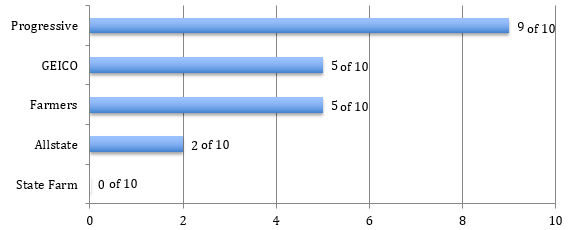
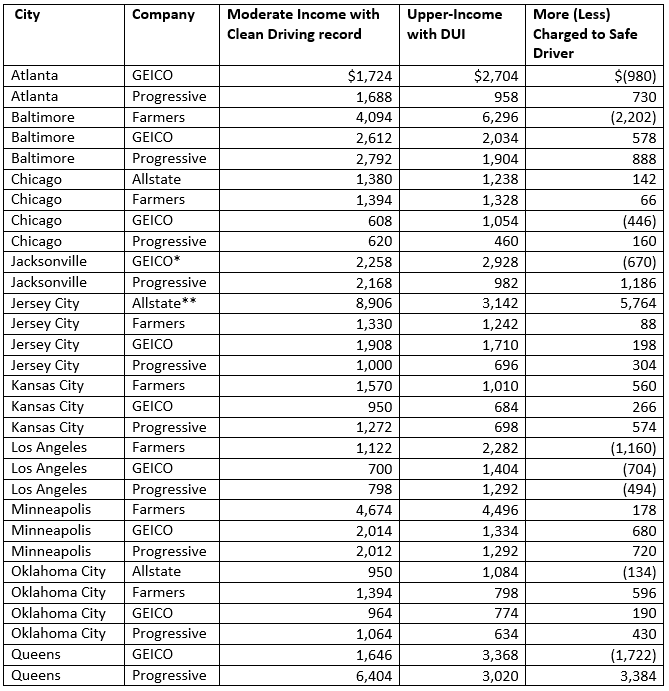

Similarly, upper-income drivers, who caused an accident leading to bodily injury of a passenger in another car during the past 12 months, were offered, on average, a lower premium than was offered to a moderate-income driver with an unblemished record. As the table below shows, of the 38 opportunities to compare a company’s quotes to these two drivers, the moderate income driver paid more 20 times, being charged 11 percent higher premiums on average, despite her perfect record and the upper-income driver having recently caused a serious accident.
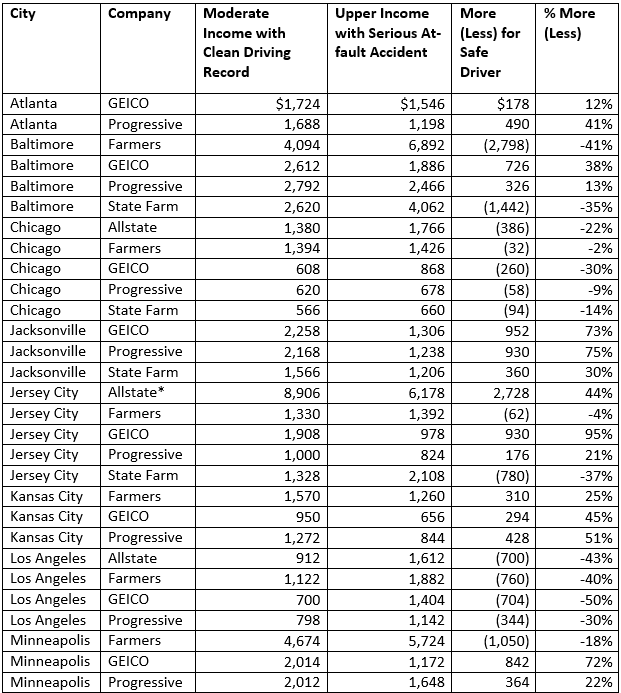
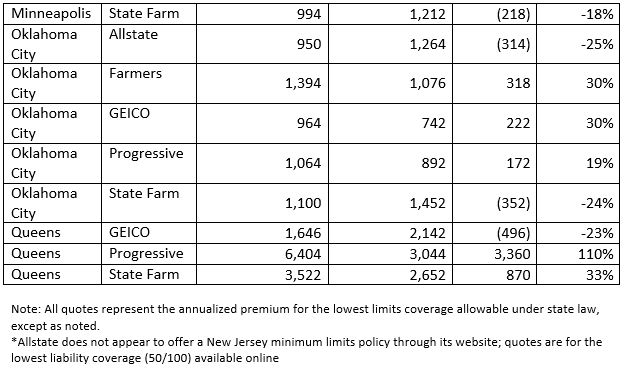
“If someone is convicted of drunk driving or caused a serious accident, they should absolutely pay more than someone with a perfect driving record,” said Douglas Heller an insurance expert who conducted the research with CFA’s Insurance Researcher Michelle Styczynski. “But as our research shows, insurance companies often charge moderate-income safe drivers a higher price despite how obviously unfair it is.”
In Most Cities, Progressive and GEICO Charge More to Moderate-Income Drivers with Perfect Records than to Higher-Income Drivers with Accidents and Violations on Their Record.
A moderate-income driver with a clean record is charged more than a higher-income driver with a recent at-fault accident and/or moving violations 86 percent of the time by Progressive and 70 percent of the time by GEICO. Only in Los Angeles, as a result of California’s strong consumer protections, do the clean drivers always pay less than the drivers with points on their record. The table below shows the annual premiums charged by Progressive and GEICO to moderate-income, clean drivers compared with higher-income drivers with various points on their record. Of the 100 quotes for higher-income drivers who caused accidents or were convicted of moving violations, in only 22 instances (in red) did the driver with the worse record pay more than the good driver of modest economic means.
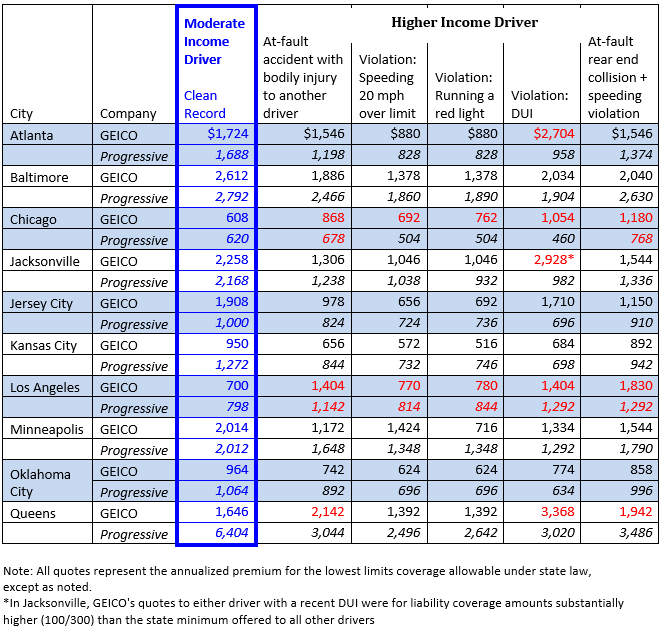
On average, GEICO charges moderate-income drivers in the cities studied $1,538 for a basic policy if they have a clean driving record while Progressive charges $1,982 for the same driver. If, however, the driver has caused an accident or been convicted of a violation (or caused an accident and been convicted of a violation) but is a higher-income person, both companies charge, on average, almost the same premium: $1,269 (GEICO) and $1,273 (Progressive).
“The data show that Progressive and GEICO are competing vigorously for the business of upper-income drivers regardless of their driving record, and they’re subsidizing that competition by overcharging moderate-income drivers with clean records. As we have seen in other research for these two insurers, auto insurance appears to be a loss-leader and marketing ploy for gaining access to higher-income people to try to sell them other products. This is unfair discrimination in my estimation and illegal in all states.” said Hunter of CFA, who is also an actuary.
Even Upper-Income Drivers with Multiple Points on Their Record Often Pay Less than Safe Drivers with Moderate Incomes
In 19 of the 36 test sets (53%) where such a comparison was possible, the premium offered to a customer with both a recent accident and violation on their record who exhibits upper-income characteristics was less expensive than the premium offered to a motorist with an unblemished record but a lower socio-economic status. GEICO and Progressive consistently offered a better deal to the upper-income driver with a bad driving record than to the moderate-income safe driver. In these instances involving multiple driving offenses, CFA is pleased to note that State Farm, Allstate, and Farmers rarely followed suit.
State lawmakers and Insurance Commissioners Should Require Insurance Companies to Place Greater Emphasis on Driving Safety Record and Give Less Weight to Personal Economic Characteristics
CFA’s findings expose an extraordinary inequity in the current pricing of auto insurance in America that must be addressed by regulators and policymakers in states across the nation. Every state except New Hampshire requires residents to purchase auto insurance in order to drive. “All those states with mandatory insurance have a special responsibility to ensure fairness in the marketplace,” noted CFA’s Hunter. “At the very least, state insurance departments should immediately study these price inequities and, if confirmed by their research, eliminate them.”
California was the only market tested in which the good drivers always paid less than the drivers with marks on their driving record. This state has the nation’s best consumer protections in place when it comes to preventing the unfair pricing revealed in CFA’s report. CFA is urging policymakers and regulators to implement consumer protections that will offer customers in their state standards of fairness in auto insurance pricing similar to California.
Contact: Bob Hunter 703-528-0062; Doug Heller 310-480-4170
CFA is a nonprofit association of more than 250 consumer groups that was founded in 1968 to advance the consumer interest through research, advocacy, and education.
Attachments:
Rating Factor Survey Results
Research Master Table of Premium Quotes

